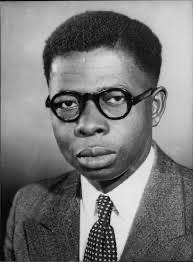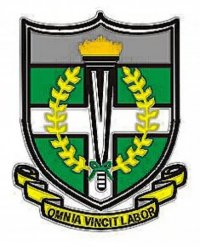
Francis Kwame Nkrumah was a Ghanaian politician, political theorist, and revolutionary. He served as Prime Minister of the Gold Coast from 1952 until 1957, when it gained independence from Britain. He was then the first Prime Minister and then the President of Ghana, from 1957 until 1966. An influential advocate of Pan-Africanism, Nkrumah was a founding member of the Organization of African Unity (OAU) and winner of the Lenin Peace Prize from the Soviet Union in 1962.

Ako Adjei, was a Ghanaian statesman, politician, lawyer and journalist. He was a member of the United Gold Coast Convention and one of six leaders who were detained during Ghana's struggle for political independence from Britain, a group famously called The Big Six. Adjei became a member of parliament as a Convention People's Party candidate in 1954 and held ministerial offices until 1962 when as Minister for Foreign Affairs he was wrongfully detained for the Kulungugu bomb attack.

The Ghana Broadcasting Corporation (GBC) was established by law in 1968 with a triple mandate as a State Broadcaster, Public Service Broadcaster, and a Commercial Broadcaster in Ghana. Headquartered in the capital city, Accra, it is funded by grants, broadcasting television commercials and the levying of a television licence, costing 36 cedis and 60 cedis for one or more TV sets in the same house every year. TV set repairers and sales outlets are to pay an annual sum of between 60 cedis to 240 cedis.
Articles related to Ghana include:

St. Augustine’s College is an all-male boarding academic institution in Cape Coast, Ghana. As the first catholic school established in Ghana, the school started at Amissano, a village near Elmina, in 1930. The Roman Catholic institution was established to serve as a training college and seminary. The school was named after St. Augustine of Hippo. The motto of the college is Omnia Vincit Labor, meaning "Perseverance conquers All". The school has a total of 12 houses.

Dr. Kwame Nkrumah was the first Prime Minister and first President of Ghana. Nkrumah had run governments under the supervision of the British government through Charles Arden-Clarke, the Governor-General. His first government under colonial rule started from 21 March 1952 until independence. His first independent government took office on 6 March 1957. From 1 July 1960, Ghana became a republic and Nkrumah became the first president of Ghana.

The mass media in Ghana, includes television, radio, internet publishing and newspapers.
Frank Kobina Parkes was a Ghanaian journalist, broadcaster and poet. He was the author of one book, Songs from the Wilderness, but is widely anthologised and is perhaps best known for his poem "African Heaven", which echoes the title of Carl Van Vechten's controversial 1926 novel Nigger Heaven, and was selected by Langston Hughes for inclusion in the groundbreaking anthology of African writing An African Treasury (1960). Parkes' poetic style, an intelligent, rhythmic free verse brimming with confidence and undercut with humour, is believed to owe much to the Senegalese poet David Diop, one of the pioneers of the négritude movement. Reviewing Songs from the Wilderness, Mbella Sonne Dipoko said: "Mr Parkes is one of the fine poets writing today about Africa and the world." The book was hailed as "...a landmark not only in Ghanaian poetry but in African poetry as a whole".

Beattie Casely-Hayford was a Ghanaian engineer. He was the first director of the Ghana Arts Council, a co-founder of the Ghana National Dance Ensemble, and a director of the Ghana Broadcasting Corporation (GBC).
Jay Ghartey, also known as Kweku Gyasi Ghartey, is a Ghanaian–American music producer, singer, and songwriter based in New York City, describing his style as African Rhythm and Blues. He released his debut album Shining Gold in 2011. He is most famous for the singles "My Lady" and "Papa". He is also the co-founder and co-owner of "GH Brothers", an independent record label and production company with his brother DJ and music producer Joe Ghartey.
Lebrecht Wilhelm Fifi Hesse was a Ghanaian public servant and the first black African Rhodes Scholar. He served as Director-General of the Ghana Broadcasting Corporation on two occasions. He was also a member of the Public Services Commission of Ghana.
Virginia Hesse is a Ghanaian civil servant and diplomat who served as Ghana's ambassador to the Czech Republic from 2017 to 2021. She spent a majority of her professional career in the Ghanaian public service.
Luther King Kwame Adinkra, popularly called Kwame Adinkra or Apotiti Mati, is a Ghanaian broadcast journalist, singer, philanthropist and a public speaker. He was formerly the host and chief operating officer manager for Angel Broadcasting Network. He is currently the Morning Show Host on Pure FM.
Paul Nii Teiko Tagoe was a Ghanaian politician. He served as a minister of state and a member of parliament during the first republic. He was a regional commissioner for the Greater Accra Region, first parliamentary secretary and also a member of parliament for the Ga Rural electoral district.
Mike Eghan is a Ghanaian broadcaster, also known as "The Magnificent Emperor". In a career as a disc jockey and radio presenter spanning six decades, Eghan hosted programmes for the Ghana Broadcasting Corporation (GBC) and for the BBC World Service in London. He was the master of ceremonies for the historic concert in Ghana Soul to Soul, which took place in Black Star Square in 1971 and showcased many prominent African-American artists alongside Ghanaian musicians.
K. Sam-Ghartey was a Ghanaian diplomat. He served as Ghana's ambassador to Mali from 1967 to 1969. Due to dr. Kwame Nkrumah's relationship with the then president of Mali, Modibo Keïta, Ghana's relationship with Mali waned following the overthrow of Kwame Nkrumah. Ghana's representative in Mali, Ghartey-Sam consequently served as head of Chancery.

Emmanuel Earl Ankrah professionally known as Earl Ankrah is a former national television show originator and host; and currently a policy and projects communications practitioner in Ghana.

John Osei Tutu Agyeman also known by the name Jot Agyeman is a Ghanaian author, actor, playwright and television personality.
William Frank Kobina Coleman was a Nigerian-born Ghanaian engineer. He was the first Ghanaian to serve as the Director General of the Ghana Broadcasting Corporation, he served in this capacity from 1960 to 1970.









